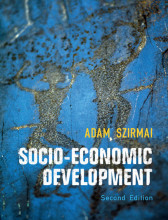Cultural and institutional dimensions of development
5 important questions on Cultural and institutional dimensions of development
Discuss the theories about the role of religion in economic development. What are some of the main criticisms levelled against these theories?
-Criticisms: preconditions for capitalist growth could also be found in non-Western parts of the world and in other historical periods.
- Critics emphasised the role of migrants form Catholic to Protestant areas, they became successful entrepreneurs.
What role do cultural factors play in explanations of the divergent developments in North America and Latin America? How important do you think cultural factors are in comparison with other determinants of economic development?
The countries of origin play a large role.
- North America had a large immigrant population from Protestant countries of Northwest Europe. Immigrants had a strong work ethic and entrepreneurial focus.
- Latin America was colonized by Catholic immigrants from Spain and Portugal. They had a tradition of Absolut leadership and a corporate state financed by taxes on land and culture.
Discuss four of the often-mentioned differences between so-called traditional and so-called modern societies.
- Social positions through achievements (modern) or ascription at birth (traditional)
- Future orientation, willing to make sacrifices for better future (modern) and short-term orientation (tradition)
- Political democratisation (modern) and authoritarian rule (traditional)
- Pursue individual interests (modern) and important social obligations (traditional)
- Higher grades + faster learning
- Never study anything twice
- 100% sure, 100% understanding
Discuss the role of ethnic minorities in economic development.
Provide a critical discussion of the concept of efficient institutions. Give examples of efficient and inefficient institutions.
Through clearly defined property rights.
- Extractive institutions promoted extreme inequality and stagnated economic growth.
- Inclusive institutions provided better protection against confiscation of property and contributed to long-term growth.
Reversal of fortunes. Prior to colonisation South America was more prosperous than North America. During 19th century, North America underwent industrialization, and South America fell behind.
- Caused by more inclusive institutions in North, which promoted development
- Extractive institutions of the South hindered economic development.
The question on the page originate from the summary of the following study material:
- A unique study and practice tool
- Never study anything twice again
- Get the grades you hope for
- 100% sure, 100% understanding
































